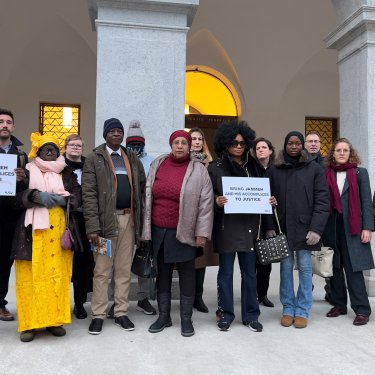Gambia: Swiss court convicts former Interior Minister for crimes against humanity, including torture of two journalists

A court in Switzerland has convicted a Gambian former top official for crimes against humanity and has sentenced him to 20 years in prison. Reporters Without Borders (RSF) welcomes the move and recalls that former president Yahya Jammeh, the main responsible of crimes committed against journalists, should now have nowhere to hide from justice.
The Federal Criminal Tribunal in Bellinzona, Switzerland, has found on 15 May Ousman Sonko, former Interior Minister of The Gambia, guilty of having committed crimes against humanity, including torture of two journalists. RSF welcomes the outcome of this important trial as another major achievement in The Gambia’s quest for accountability for the numerous crimes committed during the Jammeh era. As The Gambia’s former president, Yahya Jammeh had cruelly persecuted all perceived opponents, among them many critical journalists. His back then powerful Interior Minister Ousman Sonko was now found guilty and sentenced to 20 years imprisonment.
After Germany, Switzerland is now the second state to have investigated crimes against humanity in The Gambia during the Jammeh era. Ousman Sonko and Bai Lowe have been convicted for their contribution to crimes against those Gambians that the dictator Yahya Jammeh believed to be a threat to his power, among them many journalists. These trials under the principle of universal jurisdiction, conducted far from The Gambia and most of the victims, show that accountability is possible and they point to the next important steps: continuing the quest for justice within The Gambia and holding Jammeh himself accountable.
From 1996 to 2017, Yahya Jammeh had been imposing his cruel regime in this West-African state. To eliminate any threat to his power, he ordered extrajudicial killings of perceived opponents, including many critical journalists. Former RSF’s correspondent Deyda Hydara, Madi Ceesay and Musa Saidykhan are those among the journalists whose cases have been investigated by the courts in Celle, Germany, and Bellinzona, Switzerland. At the outcome of the trial against Ousman Sonko, the judges in Bellinzona have found that Madi Ceesay, journalist back then and member of the Gambian parliament today, and Musa Saidykhan, back then editor-in-chief of The Independent, one of the most important newspapers in The Gambia, got arrested following articles published in The Independent and, during weeks of detention, were tortured by Gambian authorities – at the time under the control of the Interior Minister. Many of the journalists’ colleagues suffered under this pattern of persecution, entire media outlets were closed, their buildings targets of arson. Being a critical journalist in The Gambia under Jammeh, meant to be in constant danger.
“Over 100 journalists fled the country to live in exile, including myself. Many others left the practice permanently, negatively affecting, albeit killing independent journalism. Until today, we are yet to recover from this loss, resulting in weakened state of independent journalism in the country,” said independent journalist Sanna Camara, who returned home in 2017 after three years in exile to continue working in the capital Banjul.
Journalists facing major obstacles in reporting from the trials
While press freedom in The Gambia has improved significantly after the Jammeh era, Gambian journalists have faced major obstacles in reporting from the trials in Germany and Switzerland. The hearings and concluding statements were held almost exclusively in German language, with no regard for the victims’ and journalists’ needs. Only a few Gambian journalists made their way to Bellinzona, despite major expenses, challenging visa processes and linguistic barriers. Mariam Sankanu and Sanna Camara have been following the trial from the first hearings on.
“Gambian journalists being able to follow this trial has brought information closer to the people who truly matter in all of this – the Gambian people, including victims. Before this trial, not much was heard of Sonko among ordinary Gambians. But the reporting by Gambian journalists, I would say, has awakened them and sparked their interest. Now everyone was looking forward to the verdict. Everyone was curious. Because they have been following,” said Gambian investigative journalist Mariam Sankanu. With support from RSF, the two journalists have made their way once more from Banjul to Bellinzona to report about the verdict.
Call for Jammeh’s extradition to The Gambia
RSF Switzerland nevertheless deplores the fact that the Tribunal did not take sufficient account of the particularities of a trial conducted on the basis of universal jurisdiction. “For such a trial to truly achieve its objectives, it should have been conducted in such conditions that the parties, witnesses, as well as public and media representatives from Gambia, could have followed the proceedings with full simultaneous translation into English provided by the Swiss court itself. This was not the case. We regret this and hope that the Federal Criminal Court will learn from it in the future,” said Denis Masmejan, RSF’s Switzerland’s Secretary General.
At the occasion of the verdict, RSF repeats its call for Jammeh to be extradited to The Gambia, where the Truth, Reconciliation and Reparation Commission (TRRC) has prepared the pathway to accountability for human rights violations under his regime and civil society insists on their government to implement the TRRC’s recommendations. Putting Jammeh himself to trial would enable another crucial step in The Gambia’s quest for accountability and further strengthen press freedom in The Gambia.
